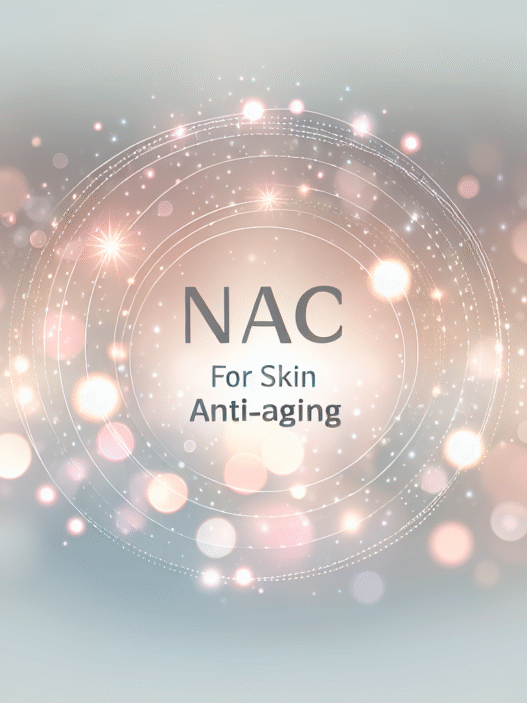Understanding NAC Supplementation
What is NAC?
N-acetylcysteine (NAC) is a supplement that serves multiple potential purposes, from supporting liver health to enhancing athletic performance. It is not typically found in food sources, making supplementation a common option for individuals looking to boost their cysteine levels and subsequently increase glutathione production in the body (WebMD). Glutathione is a significant antioxidant that plays a crucial role in combating oxidative stress and eliminating harmful free radicals, which are often associated with various health issues.
For those asking, “is it ok to take NAC every day?,” while daily supplementation can be beneficial for many, it is essential to consult with a healthcare professional to tailor use according to individual health needs and conditions.
Potential Uses of NAC
NAC has garnered attention for its wide range of potential applications in health management:
| Potential Use | Description |
|---|---|
| Chronic Lung Issues | NAC may assist individuals with chronic lung conditions by acting as a mucolytic agent, helping to break down and expel mucus. |
| Polycystic Ovary Syndrome (PCOS) | This supplement can improve insulin sensitivity and potentially help manage symptoms related to PCOS. |
| Preterm Birth Risk Reduction | NAC supplementation might decrease the risk of preterm birth, particularly for those with past delivery histories (Medical News Today). |
| Antioxidant Support | By increasing glutathione levels, NAC aids in reducing oxidative stress, which may lower the risks for various health conditions including heart disease, diabetes, and infertility (WebMD). |
The versatility of NAC makes it a compelling option for individuals focused on liver health and detoxification, along with longevity seekers looking to enhance overall well-being.
Benefits of NAC
N-acetyl cysteine (NAC) has garnered attention for its diverse potential health benefits. Below are some of the key areas where NAC supplementation could play a significant role.
Psychiatric Conditions
Research indicates that NAC supplementation may help in treating psychiatric conditions. It enhances levels of neurotransmitters, aiding mental function and alleviating symptoms of various psychiatric issues. For instance, studies have shown that NAC can be beneficial for individuals suffering from bipolar disorder, depression, and anxiety disorders (Medical News Today).
| Condition | Effect of NAC |
|---|---|
| Bipolar Disorder | Potential mood stabilization |
| Depression | Alleviation of symptoms |
| Anxiety Disorders | Reduction in anxiety symptoms |
Chronic Lung Conditions
NAC is commonly known for its role in respiratory health. It works as a mucolytic agent, helping to break down mucus in the lungs and making it easier to breathe. This is especially beneficial for individuals suffering from chronic lung conditions, such as chronic obstructive pulmonary disease (COPD) and asthma. Its antioxidant properties also support lung function by reducing oxidative stress in the respiratory system.
| Condition | Effect of NAC |
|---|---|
| COPD | Improved lung function |
| Asthma | Reduction in mucus and inflammation |
For useful information about how NAC may ease mucus buildup, check our article on can acetylcysteine remove phlegm?.
Polycystic Ovary Syndrome (PCOS)
NAC may benefit individuals with polycystic ovary syndrome (PCOS) by improving insulin sensitivity and reducing high blood sugar levels. A review in 2017 highlighted that NAC could be effectively used as part of a comprehensive treatment plan for PCOS, particularly for those struggling with metabolic issues and fertility concerns.
| Benefit | Effect |
|---|---|
| Insulin Sensitivity | Improvement observed |
| Blood Sugars | Reduction noted |
Preterm Birth Risk Reduction
Supplementation with NAC has been studied for its potential to reduce the risk of preterm birth, particularly in women with individual histories of preterm delivery and bacterial vaginosis. A 2017 review determined that starting oral NAC intake at 0.6 g daily after the 16th week of pregnancy, combined with progesterone, may help protect against recurrent preterm births and offer benefits for neonatal health.
| Risk Factor | Effect of NAC |
|---|---|
| Preterm Birth | Risk reduction observed |
| Neonatal Health | Positive outcomes suggested |
In summary, NAC has significant potential in various health areas, offering support for psychiatric conditions, chronic lung diseases, PCOS, and preterm birth risk reduction. For those considering supplementation, understanding these benefits can help in deciding, “is it ok to take NAC every day?”
Safety and Usage of NAC
FDA Considerations on NAC
N-Acetyl Cysteine (NAC) has been widely regarded for its potential health benefits, particularly concerning liver health and detoxification. However, it is important to understand its regulation and status among health supplements. According to the FDA, NAC was initially approved as a prescription medication for treating acetaminophen overdoses and has been utilized in various clinical settings. Despite its uses, the FDA has expressed concerns regarding the marketing of NAC as a dietary supplement, leading to debates about its regulatory status and availability.
Individuals interested in using NAC supplements should consider that while NAC is generally regarded as safe, its status can change based on emerging evidence and regulatory review. It is crucial to stay informed about the latest guidelines regarding NAC supplementation, as they may impact whether it is advisable to take NAC every day.
Known Interactions and Safety Precautions
Before starting any new supplement, it is critical to understand possible interactions and safety measures concerning NAC. Research highlights various potential interactions and risks associated with NAC supplementation:
| Interaction/Precaution | Details |
|---|---|
| Medications | NAC may interact with certain medications, including nitroglycerin or vasodilators, potentially enhancing their effects. WebMD |
| Medical Conditions | Individuals with asthma, peptic ulcers, or those who have had an allergic reaction to NAC should exercise caution. WebMD |
| Pregnancy and Nursing | Limited research exists regarding the safety of NAC during pregnancy and breastfeeding. Consultation with a healthcare provider is recommended. WebMD |
| Side Effects | Some users may experience side effects, such as gastrointestinal discomfort or headache. Monitoring one’s response to NAC is essential. WebMD |
Patients considering NAC supplementation should consult healthcare professionals to discuss any existing health conditions and medications, ensuring safe usage. It is also essential to follow recommended dosages and pay attention to any signs of adverse reactions. For further information on potential side effects, visit our article on what are the negative side effects of nac?.
Awareness regarding interactions and safety precautions can facilitate safer supplementation of NAC, allowing individuals to reap its possible benefits while minimizing risks.
Effectiveness of NAC
N-Acetyl Cysteine (NAC) is recognized for its versatile application in various health scenarios. This section focuses on its effectiveness in treating acetaminophen overdoses, its role in chronic lung diseases, and its potential benefits across a range of health areas.
Acetaminophen Overdose Treatment
NAC has gained prominence as a crucial treatment for acetaminophen poisoning. It works by replenishing glutathione, a powerful antioxidant in the liver, which helps detoxify harmful substances. Studies suggest that it can effectively alleviate the toxic effects of acetaminophen (US National Library of Medicine – PubMed).
| Treatment Method | Effectiveness |
|---|---|
| N-acetylcysteine (NAC) | Proven treatment for acetaminophen overdose |
| Activated Charcoal | May reduce need for NAC treatment |
Role in Chronic Lung Diseases
Research indicates that NAC may offer benefits for individuals with chronic lung diseases, such as Chronic Obstructive Pulmonary Disease (COPD). Its anti-inflammatory properties can help reduce airway inflammation, making symptoms like wheezing and coughing less severe. Additionally, it may lessen lung damage in conditions like cystic fibrosis, though more research is necessary to firmly establish its effectiveness (WebMD).
| Condition | Potential NAC Benefit |
|---|---|
| COPD | Reduces inflammation in airways |
| Cystic Fibrosis | Lessens lung damage |
Potential Benefits in Various Health Areas
NAC’s therapeutic applications are expanding beyond its traditional uses. Emerging research suggests it may help with multiple health issues, including:
- Inflammation: NAC has been shown to lower inflammation levels, oxidative stress, and insulin resistance, contributing to various metabolic processes.
- Mental Health: Studies are exploring NAC’s role in improving mental health conditions such as depression, schizophrenia, and substance use disorders.
- Liver and Kidney Function: It may enhance the function of both liver and kidneys, contributing to overall detoxification and health.
- Viral Suppression: There is ongoing research into its potential effects in viral infections such as HIV.
- Blood Sugar Regulation: NAC may aid in blood sugar balance for insulin-resistant individuals, supporting metabolic health.
| Health Area | Potential NAC Benefits |
|---|---|
| Inflammation | Reduces oxidative stress and insulin resistance |
| Mental Health | Might improve conditions like depression |
| Liver Function | Enhances detoxification processes |
| Viral Infections | Potential role in viral suppression |
| Blood Sugar Regulation | Aids insulin resistance |
The effectiveness of NAC in these areas underscores its growing importance in health and wellness. As research continues, it’s essential for those seeking to understand if “is it ok to take NAC every day?” to consider these potential benefits along with consultation from healthcare professionals. For more detailed insights on NAC, including its uses and side effects, visit our page on what is NAC N-acetyl cysteine used for?.
NAC and Oxidative Stress
Role in Antioxidant Activity
N-acetyl cysteine (NAC) serves as a powerful antioxidant in the body, primarily by enhancing the production of glutathione, a critical antioxidant that mitigates oxidative stress. NAC directly acts as a scavenger of free radicals, specifically targeting oxygen radicals. This capability helps in reducing oxidative damage to cells, which is linked to numerous health conditions, including heart disease and diabetes (WebMD).
The following table summarizes the antioxidant functions of NAC:
| Function | Description |
|---|---|
| Glutathione Enhancement | Boosts glutathione production, aiding in detoxification. |
| Free Radical Scavenging | Neutralizes free radicals and reduces oxidative stress. |
| Anti-inflammatory Effects | Helps lower inflammation linked to various chronic diseases. |
Impact on Glutathione Levels
NAC is a precursor to L-cysteine, a critical amino acid for glutathione synthesis. Increased levels of glutathione contribute to better management of oxidative stress and protection against cellular damage. Studies indicate that higher glutathione levels can support overall health and aid in reducing the risk of conditions related to oxidative stress (PMC).
Maintaining optimal glutathione levels is essential for various bodily functions, as shown in the following table:
| Health Aspect | Importance of Glutathione |
|---|---|
| Detoxification | Facilitates removal of toxins from the body. |
| Immune Function | Supports the immune response against infections. |
| Cellular Repair | Aids in the repair of damaged cells and tissues. |
Preventative Potential Against Health Conditions
The antioxidant and anti-inflammatory properties of NAC hold promise for preventing various health issues linked to oxidative stress. Its therapeutic potential has been explored for a range of conditions, including chronic obstructive pulmonary disease (COPD), heart disease, psychiatric disorders, and infertility. By minimizing oxidative damage, NAC may help in lowering the risk of developing these conditions.
Research indicates that NAC supplementation not only acts as a protective agent but may also enhance recovery from disease processes associated with oxidative stress. This ability to provide preventative health benefits makes NAC an intriguing candidate for daily use.
For those curious about whether or not to include NAC in their daily routine, the question remains, is it ok to take NAC everyday?.
Research and Future Potential
Ongoing Studies and Trials
N-acetyl cysteine (NAC) is currently being investigated for its potential therapeutic benefits in a variety of health conditions. Research is exploring NAC’s effectiveness in treating chronic obstructive pulmonary disease (COPD), cystic fibrosis, idiopathic pulmonary fibrosis (IPF), and diabetic cardiomyopathy, among others. Additionally, NAC may enhance the response to interferon-alpha in chronic hepatitis C PubMed. Other studies are examining its applications in mental health disorders such as schizophrenia, bipolar disorder, and depression, as well as its potential role in improving liver and kidney function WebMD.
| Condition | Ongoing Research Focus |
|---|---|
| Chronic Lung Diseases | COPD, Cystic Fibrosis, IPF |
| Cardiovascular Health | Diabetic Cardiomyopathy, Heart Failure |
| Mental Health | Schizophrenia, Bipolar Disorder, Depression |
| Liver Health | Enhancing Liver Function |
| Viral Diseases | HIV Viral Suppression |
Potential Therapeutic Applications
NAC has established itself as an effective treatment for acetaminophen (paracetamol) poisoning, making it a critical resource in emergency medicine. Its ability to elevate glutathione biosynthesis positions NAC as a powerful antioxidant, capable of scavenging free radicals, particularly oxygen radicals. This property is beneficial in various disorders caused by oxidative stress PMC. Ongoing research is assessing NAC’s impact on health areas such as inflammation and detoxification, making it a versatile supplement for longevity seekers.
Safety and Efficacy Considerations
As with any supplement, the safety and efficacy of NAC are critical. Studies indicate that NAC is generally well-tolerated, with minimal side effects reported. However, caution is advised for individuals with certain medical conditions. For detailed information regarding any potential concerns, visit our article on what are the negative side effects of NAC?.
In summary, the ongoing trials and research surrounding NAC suggest promising avenues for its use in various health conditions, underscoring its status as a significant supplement for those concerned about liver health or detoxification. For those considering regular use of NAC, it is essential to stay informed about emerging studies and potential applications; thus, understanding “is it ok to take NAC every day?” becomes an important question for many.



















